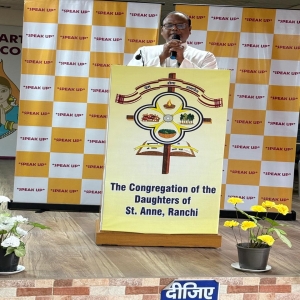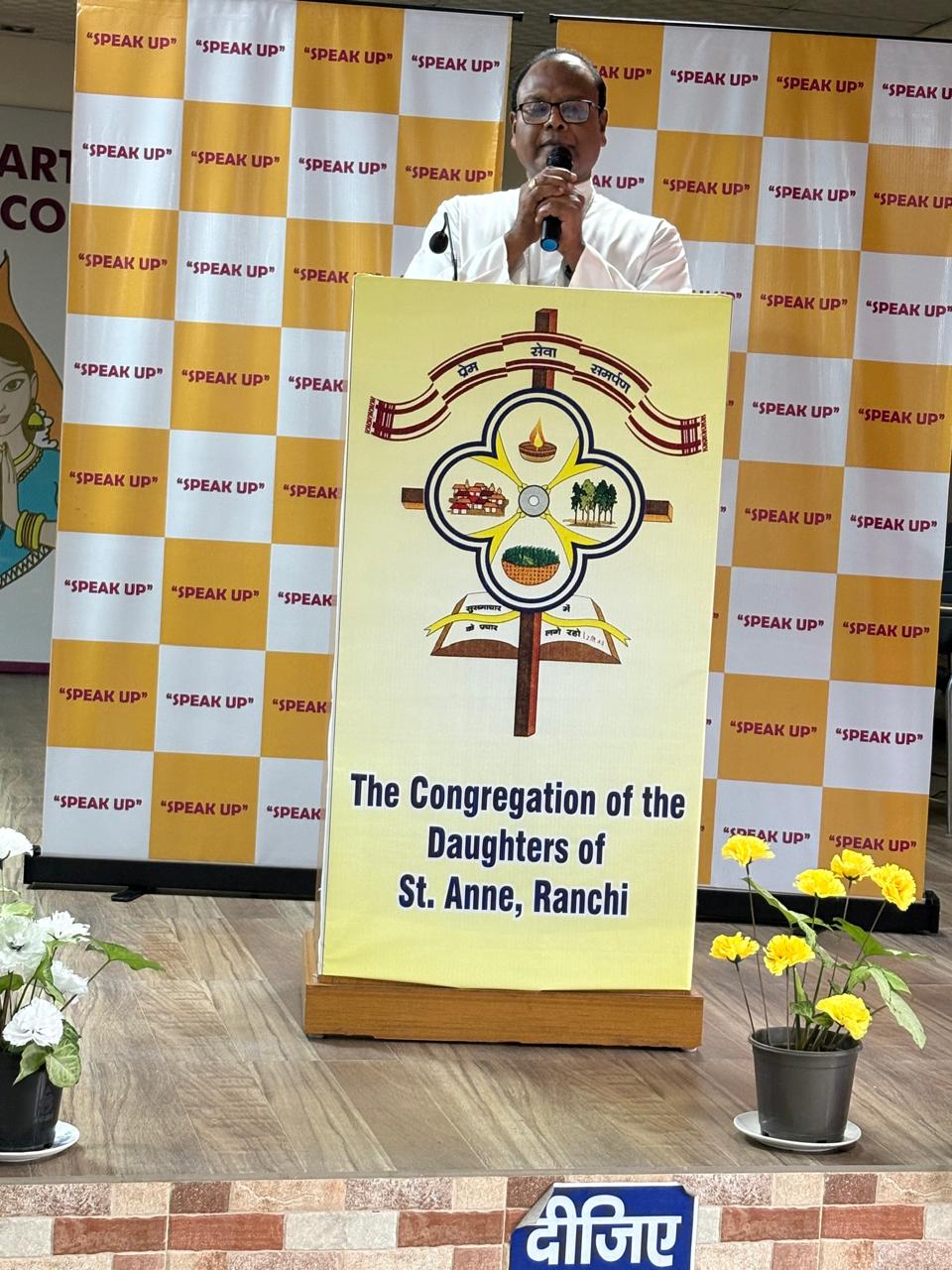
.png) Francis Sunil Rosario
Francis Sunil Rosario

"Speak Up, Ranchi" was an innovative and inspiring full-day brainstorming session organised by the Ranchi Archdiocese under the leadership of its shepherd, Most Rev. Vincent Aind, the Archbishop of Ranchi, designed to awaken the Christian communities of Jharkhand to building their societies and the nation as a whole.
The Archbishop inaugurated the session, invoking the blessings of the Almighty:
"It's a joint venture of all Christians to put our mind and thoughts to speak up boldly, walk together with courage and be with people, especially the oppressed and the marginalised and to create a better atmosphere of fellowship, fraternity and belongingness. It's our joint endeavour to preserve fundamental rights and privileges ... Our Churches are under constant threat in some parts of the country. We are a part of nation building. Our contributions in various areas of development are noteworthy. Bless us Lord that we put up our best voice forward - finding resourceful persons who can help in our endeavours. With strength of Jesus and guidance of the Holy Spirit we march forward towards building the Church, humanity and people of God."
The resource personnel featured experts, Mr Derek O'Brien, a fearless and outspoken Rajya Sabha MP from Bengal (TMC), and Rev. Fr. Cedric Prakash, SJ, a prophetic voice in India fighting for minority rights. Both motivated the participants to 'speak up' about matters of concern and fight injustices and oppression through action-oriented, time-bound programs.
They presented data on the impact made by Christians who have helped support the nation. They emphasised the power of a deep prayer life and intense spirituality to motivate people of goodwill towards building communities of love.
Fr. Cedric Prakash, contextualising the most recent documents by the late Pope Francis and Pope Leo XIV, drew attention to the recent encyclical "Dilexit Nos" (He Loved Us), which explores the human and divine love at the heart of Jesus Christ. "A society dominated by narcissism and self-centredness will increasingly become 'heartless.' This will lead in turn to the' loss of desire,' since as other persons disappear from the horizon we find ourselves trapped within walls of our own making, no longer capable of healthy relationships."
The maiden apostolic exhortation of Pope Leo XIV, "Dilexi Te" (I Have Loved You), the sequel to Dilexit Nos, focuses on Christ's love for the poor and the call for the Church to renew its commitment to those most in need.
Mr Derek Obrien, one of the most outspoken MPs, who has been active in politics for the last 15 years, enlightened the assembly on minority rights and human dignity. He presented the most recent statistics of Christian communities in South Asian countries. As of 2025, the Christian population in Asia is estimated to be approximately 298 million (28 crore 90 lakh), which constitutes about 6.53% of the continent's total population. Christianity is a widespread minority religion in Asia, with the largest populations found in the following countries:
Philippines: 102.32 million
China: 72.41 million
India: 33.8 million (2.3%)
Indonesia: 26.93 million
South Korea: 15 million
Other Asian nations with significant Christian populations include Vietnam, Kazakhstan, Georgia, and Armenia. Christianity is the majority religion in countries such as the Philippines, East Timor, Armenia, Georgia, and Cyprus.
Though a minority, the Christian role has been immense. O'Brien emphasised that Christians should overcome the "Minority Syndrome" and count more on the strength of their communities. Our service in the areas of education, healthcare, and Socio-economic development is well known to all. We should take pride in them.
He shared his experience of his visit to CM during his brief trip to Ranchi. The Chief Minister, Hemant Soren, was very cordial and positive in meeting Mr O'Brien, and he gave him 45 minutes. They shared their views on the ground realities in Jharkhand. They discussed matters of deep concern to the poor and marginalised, and how Christian communities' resources could be utilised for the state and the country.
He invited some clergy and religious leaders to speak about their efforts in their respective areas. Rev. Fr. Vishu Benjamin Aind, the Vicar General of Khunti Diocese, talked at length about the work done by the Christians in his diocese. He reiterated that communities should fight for justice at all costs, just as the missionaries of the past have done.
Mr O'Brien presented the case of Atal Mohalla Clinics, which was established alongside the state of Jharkhand during the time of the Late Atal Bihari Vajpayee. This project was an utter failure. Hence, the government, under Mr Soren, renamed it the "Mother Teresa Advanced Health Clinics." (footnote: Atal Mohalla Clinics in Jharkhand are a network of primary healthcare facilities established to provide free and comprehensive healthcare services to urban slum areas. These clinics aim to bridge the gap in healthcare access and reduce the burden on larger hospitals by offering basic medical services, including treatment for common ailments, free medicines, and basic lab tests.) While the majority approved of the renaming, a few were sceptical of the move. Mr O'Brien, observing this, stated that respecting the opinions of individuals paves the way for developing understanding and a process to grow together for the common cause.
Mr Derek opined that it was high time for various denominations to come together. He presented some of the common objectives shared by Christians of all denominations towards cementing fellowship and understanding, and helping communities grow in strength. It is time to acknowledge that all Christian children should have the opportunity to attend Christian schools, and similarly, that the choice of teachers should be made with consideration for their Christian values.
Preference should be given to Christian teachers who are qualified in their subjects. Christian leaders should take specific political measures to ensure their voices are heard in parliament and government circles. That's the way the Church can become a force to motivate and bring about change in the system.
During the session, examples of missionaries who stood firm for the cause of humanity, fighting for justice and peace, were cited. The most recent case was of Late Fr. Stan Swamy, SJ, who initiated the cause of displaced people and migrant labourers at Bagaicha, Namkom, and was falsely accused and became a martyr.
When Christian missions began in Jharkhand, formerly known as Chotanagpur, the Belgian missionaries were not afraid to reach out and evangelise, preaching the good news. Fr. Constant Lievens, SJ; Fr. Edward De Meulder, SJ; Fr. John Baptist Hoffman, SJ; Fr. A. Van Exem, SJ; and many others have planted the seeds of Christ in the most remote areas. Today, the Church is showing signs of growth in numerous vocations and its involvement in missionary endeavours across the globe and beyond boundaries.
In the concluding remarks celebrating the Diamond Jubilee of Nostra Aetate, Pope Francis, the Holy Father, rekindled the hope that Nostra Aetate brought to a post-war world sixty years ago. "Today we are called to re-establish that same hope in our war-torn world and our wounded environment," he said. "Let us work together, because if we are united, everything is possible. Let nothing divide us."